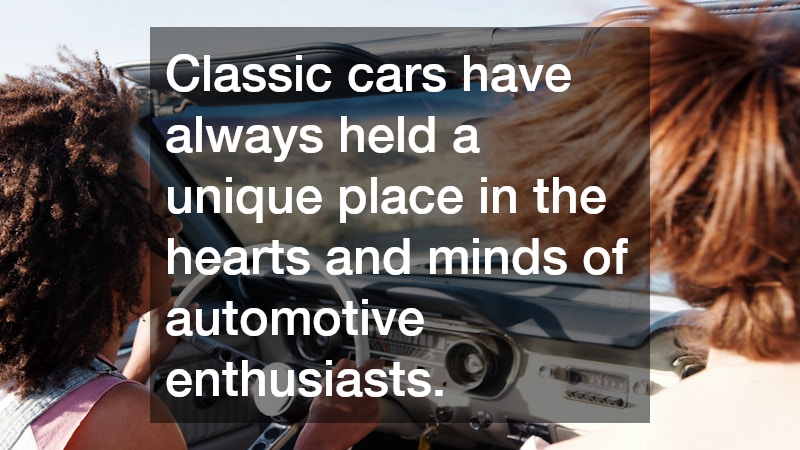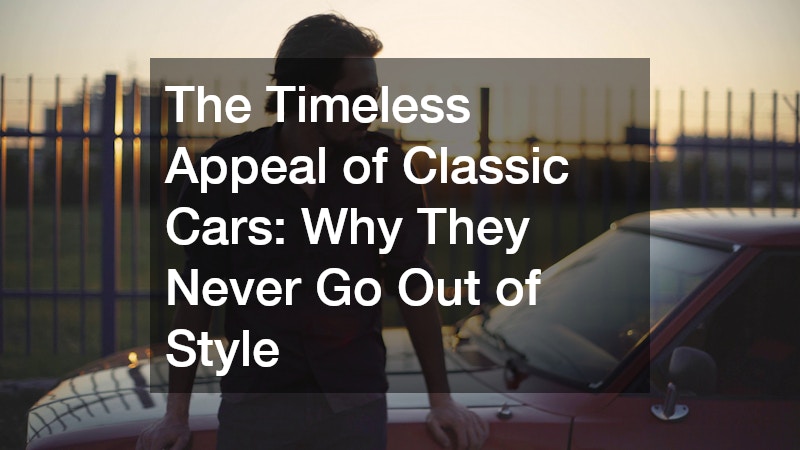
The Timeless Appeal of Classic Cars: Why They Never Go Out of Style
Classic cars have always held a unique place in the hearts and minds of automotive enthusiasts. Their enduring fascination stems from a blend of historical significance, aesthetic appeal, and cultural impact that continues to resonate across generations.
Why Are Classic Cars So Valuable?
Economic Factors Influencing Value
The value of classic cars is intricately tied to economic factors such as rarity, demand, and prevailing market trends. Rare models, especially those produced in limited numbers, often fetch higher prices because they are less likely to be found and therefore more coveted by collectors.
Market trends can significantly influence the value of classic cars, especially when certain models become associated with iconic events or personalities. This dynamic nature of the market means that the valuation of classic cars can fluctuate, since a sudden surge in interest can drive up demand and price.
In addition, economic factors like the state of the economy and disposable income levels among potential buyers play a role. During economic booms, more people have the means and interest to invest in classic cars, which can lead to increased demand and higher values.
Emotional and Cultural Significance
The value of classic cars is not solely determined by economic factors; it is also deeply rooted in their emotional and cultural significance. Many collectors and enthusiasts associate classic cars with nostalgic memories, whether it be family road trips or formative life experiences.
The cultural impact of classic cars is evident when considering their appearances in films, television shows, and other media. Iconic models from the 1960s and 1970s, for instance, have become symbols of an era, representing freedom, innovation, and the spirit of adventure.
Furthermore, owning a classic car is often seen as a status symbol, conveying a message of taste, refinement, and appreciation for history. This emotional connection and cultural relevance significantly enhance their allure and value, making classic cars a cherished part of personal legacies.
How to Maintain a Classic Car?
Basic Maintenance Tips
Maintaining a classic car requires dedication and attention to detail in order to preserve its quality and functionality. Regular oil changes and fluid checks are fundamental maintenance tasks that can significantly prolong the life of the engine.
In addition to routine mechanical care, safeguarding the car’s exterior through proper washing, waxing, and rust prevention techniques is crucial. This not only maintains the car’s aesthetic appeal but also protects it from environmental damage that could degrade its value over time.
Moreover, utilizing climate-controlled storage can help protect the car from weather-induced deterioration. Ensure that the vehicle is often driven, as regular use can help prevent mechanical issues that arise from prolonged inactivity.
Restoration vs. Preservation Strategies
When it comes to classic car upkeep, owners often debate between restoration and preservation strategies. Restoration involves bringing a vehicle back to its original condition, often a painstaking process that requires extensive research and sourcing of authentic parts to maintain historical accuracy.
Preservation, on the other hand, focuses on conserving the car’s current condition while maintaining its integrity. This approach may appeal to collectors who wish to retain the vehicle’s original charm and authentic patina, which can sometimes be of greater value than a fully restored version.
The choice between restoration and preservation often depends on personal preference and the specific car in question. Enthusiasts must consider factors like historical significance, rarity, and the personal connection they have with the car, which will guide their decision on how best to enjoy and maintain their classic vehicle.
Conclusion
In conclusion, classic cars continue to hold a remarkable appeal due to their blend of historical, economic, and cultural significance. They represent more than just simple means of transportation; they are symbols of innovation, beauty, and personal history.
Their timelessness lies in their unique ability to evoke nostalgia and admiration across generations, while offering both owners and onlookers a glimpse into a world where craftsmanship and style were paramount. As such, classic cars remain a cherished passion for many, capturing the imagination and enthusiasm of collectors and enthusiasts worldwide.



